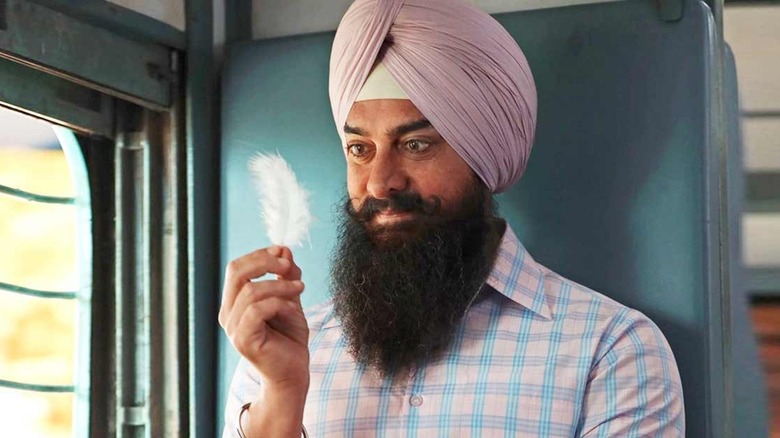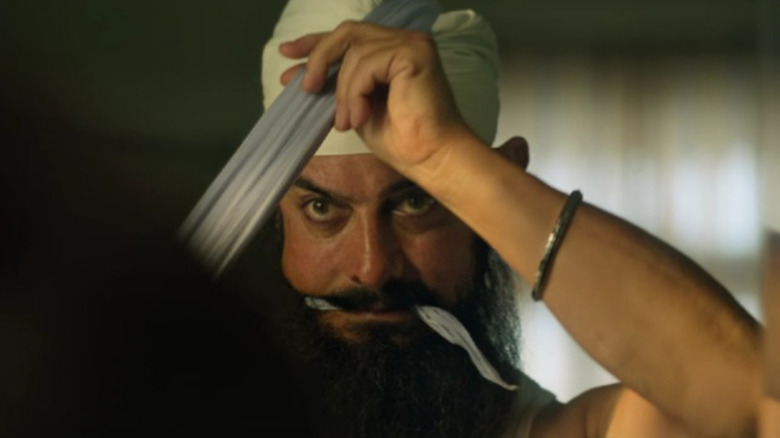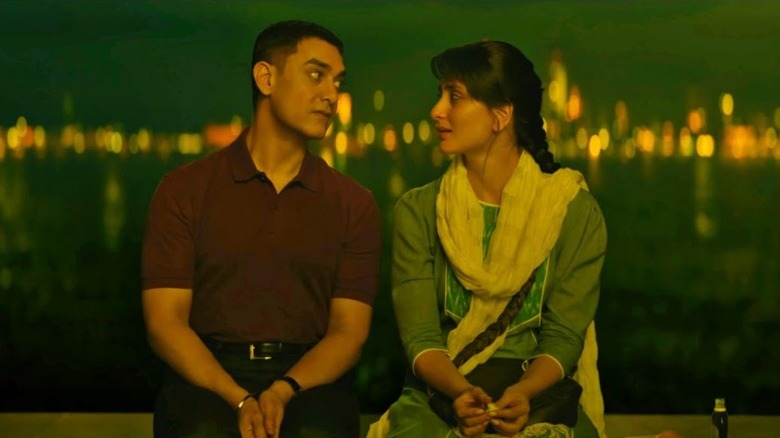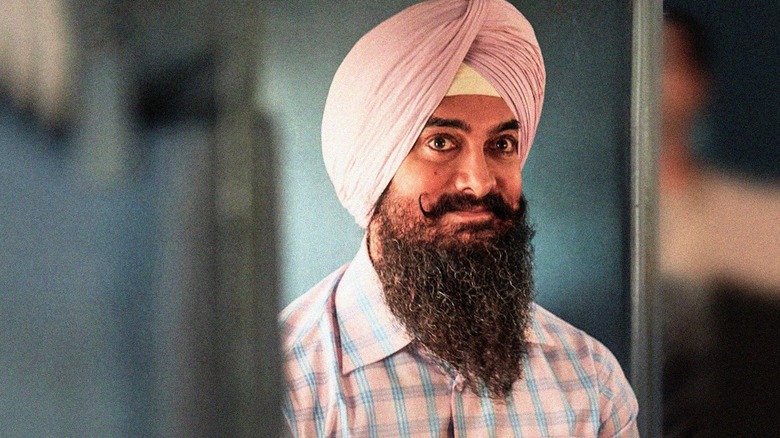Laal Singh Chaddha Review: Forrest Gump, Minus The Mawkishness
In Robert Zemeckis' 1994 Oscar-winning film "Forrest Gump," based on the novel by Winston Groom, the title character — Tom Hanks affecting a unique Southern drawl — shares the folksy wisdom that life is like a box of chocolates, in that you never know what you're going to get. This cutesy axiom is emblematic of the film's tendency to skew clumsy. It presents a simplified, candy apple version Americana wherein anyone, so long as they unwittingly serve as agents of American institutions — college football teams, business owners, soldiers — will be blessed with miraculous wealth. Forrest Gump was also responsible for unwittingly aiding in the formation of several vital American institutions, from Elvis Presley's dancing style to the phrase "s*** happens." The film strives so open-heartedly to capture an apple-pie-scented, old-world America, it's difficult not to be moved to cynicism. Even in the 1990s, pundits noticed its aggressive tendency toward irresponsible right-leaning Boomer nostalgia.
In "Laal Singh Chaddha," Advait Chandan's remake of "Forrest Gump," Bollywood superstar Aamir Khan ("3 Idiots," "Dangal") plays the title character as possessed of the same wide-eyed innocence as his American forebear, but, perhaps thanks to the filmmakers' overwhelming sense of corny earnestness, emerges as a more propitiating figure. Laal is moved less by an impulse to follow orders, and more by the enthused affection and caring he carries for his mother (Mona Singh), his beloved childhood girlfriend Rupa (Kareena Kapoor), and the enemy-soldier-turned-friend whom he rescues and eventually goes into business with (Manav Vij).
"Laal Singh Chaddha" might still be as fitfully mawkish as "Gump" in its tendency toward brazen sentimentality, but is a film more deliberately rooted in philosophies of gentleness. It is the superior version.
The savant clichés
Much of "Laal" repeats beats, and even some shots, from Zemeckis' 1994 film almost verbatim. Laal (as a child, played by Gurfateh Grewal) cathartically runs from bullies, breaking free of the leg braces that he wore throughout childhood. He becomes a sports star in school. He enlists in a war effort, and while training falls in with a socially awkward, obsessive soldier (Naga Chaitanya Akkineni) keen on starting a business after the war. He rescues an injured battlefield foe. Laal becomes successful, meets real-world dignitaries, loses important people in his life, runs across the country for years at a time, and pines constantly for Rupa. All the while, important moments of Indian history are constantly playing on TV in the background, with Laal walking past them without the attention span to absorb them.
A few of the details are different, however. Instead of shrimp, Laal is roped into the undergarment business (the real-life Rupa Underwear, it so happens).
Both Laal and Gump are depicted as mentally disadvantaged, but while Gump's actual IQ is given on camera (it is 75), Laal — while often called a "dimwit" — is presented more as being on the autism spectrum. He is hyperfocused, has a great capacity developing individual skills, and while lacking a certain social finesse, understands kindness when he sees it. While "Laal" has no interest in exploring the fineries of life on the spectrum, it does appear to be mercifully free of trite "Gump" savant clichés.
Rupa, not fallen
Another notable improvement "Laal" has over "Gump" is its treatment of Rupa (the character of Jenny from the original was played by Robin Wright). Jenny is a sacrificial lamb in "Gump," following an unfortunate "fallen woman" narrative that wouldn't have felt out-of-place in a 1930s scare film. A young girl, abused by a parent, grows up to seek success on her own terms, falls into sex work — a tragic profession in the eyes of the film — and will ultimately fall to HIV. This is an interpretation of the character that Wright herself disagrees with, but it's certainly hard to look around it.
"Laal Singh Chaddha" permits Rupa a great deal more humanity. Rupa marries a gangster and serves as his "heroine," a common term for "lead actress" that's used pejoratively to suggests she works as a concubine. While much of her story is obfuscated by modesty — Bollywood movies tend to be prudish and rarely feature scenes of sex or drugs — her difficult situation is brought about by financial desperation. She is a victim not of her own agency, but by an uptight public's wolf-like need to shame her after she sat for a naked photoshoot. "Gump" seemed all too eager to punish Jenny. "Laal" implicates the world for her ills.
Indeed, "Laal Sigh Chaddha" stretches its arms wide in addressing broader themes of religious persecution. In 1984, Indira Gandhi was assassinated by her Sikh bodyguards, leading to many violent anti-Sikh riots. Laal, a Sikh, must cut his hair and go into hiding to avoid the violent waves of hate that periodically sweep through the country; in a cute detail, when a new bout of religious violence occurs, Laal's mother calls him and tells him to stay indoors because of a malaria outbreak. Later in the film, that kind of religious persecution will be expressly equated to an actual illness.
Forgiveness and faith
In "Gump," Forrest's philosophy seemed to spring from a secular place; it was a belief in markedly American institutions that carried him through. In "Laal," broader, larger thoughts of forgiveness and gentleness are expressed out loud. Laal does not run into a battlefield to save a superior officer as Forrest did in "Gump" (the character of Dan, played by Gary Sinise), but makes a similar risk for his wartime rival. The resentment of the character — named Mohammad in "Laal" — is not based in an aborted attempt to patriotically sacrifice one's self for their country as it was for Sinise. Mohammad was merely shamed by an enemy soldier morally out-maneuvering him. "Gump" seems to feel that war is part of American life. "Laal" is critical of the thoughts that lead to it.
"Laal" also stands apart from "Gump" in that the main character witnesses several moments of Indian history, but is never depicted as history's beatific guardian angel (the cute cameo from pop sensation Shah Rukh Khan notwithstanding). The filmmakers never have the conceit to declare Laal the linchpin India's national character. He is but a human. The film is better for it.
"Laal Singh Chaddha" is hardly a Terrence Malick-like contemplation of pacifist philosophy — it's ultimately a broad, sentimentalist opera designed to have audiences reaching for their handkerchiefs — but it does have a more complex and gentle point of view than the film it's remaking. Despite how corny it is, "Laal Singh Chaddha" it unexpectedly disarming.
/Film Rating: 7 out of 10



